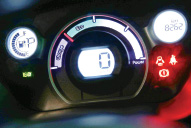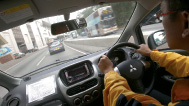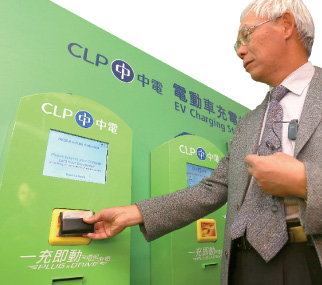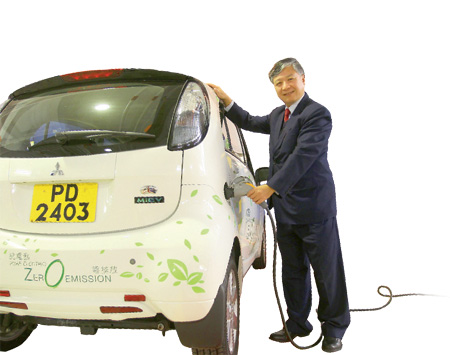A jolt in the right direction
Updated: 2011-01-18 07:24
By Guo Jiaxue(HK Edition)
|
|||||||
|
Electric vehicles are much more energy-efficient than motor vehicles. |
The city has taken up a heavy challenge in efforts to address its notorious air pollution problem. The centerpiece of the effort will be the electric vehicle. But time is short and there are many obstacles in the way before a 60 percent reduction in carbon emissions can be achieved. Guo Jiaxue reports.
"Hong Kong is under pressure," said Carlos Lo Wing-hung, a professor at the Polytechnic University. The expert in environmental governance in China was speaking about air quality and Hong Kong's commitment to reduce carbon emissions by 60 percent by 2020.
Hong Kong declined to set a specific target for carbon reduction at the 2009 Copenhagen summit on the climate. The city did however sign on to the agreement to cut carbon emissions.
Chief Executive Donald Tsang declared Hong Kong's major commitment to cut emissions by 60 percent in last October's Policy Address. Achieving that objective will pose a significant challenge.
"That is quite an aggressive goal," Lo said. China promises a 45-percent improvement in carbon intensity. It's very clear that a low-carbon economy will be China's future direction. Many mainland cities have been working very hard on carbon reduction. Hong Kong faces the same demand and also is under pressure, Lo explained.
Within weeks of the Policy Address, the government began taking steps.
Secretary for the Environment Edward Yau Tang-wah announced in early November that within the short span of a few months, the number of electric vehicle charging stations in Hong Kong would increase from approximately 100 to more than 500.
That's ambitious, to say the least, given that there are only about 100 electric vehicles in all Hong Kong and 20 of those are government vehicles.
|
Mak Chai-ming doesn't think electric vehicles are inferior to motor ones. |
The government, however, predicts optimistically that by 2020, 30 percent of private cars and 15 percent of buses and goods vehicles will be either electric or hybrid gas and electric.
Electric utilities executives signed on with zeal to become partners in promoting electric vehicles. Hong Kong Electric and CLP wasted no time setting up electric vehicle leasing programs. CLP even offered to provide funds and to open even more charging stations.
The C40 forum in November was opportune. Speakers from all over the world gathered, to join the choir, singing the praises of electric vehicles and their importance for reducing carbon emissions.
The rise of electric vehicles appears set to become the first wave of the low carbon economy in Hong Kong, riding the current toward cleaner air.
"I think policy makers prefer this approach because ... there are too many cars on the road (causing pollution). It's hard to control emissions. To control the emission at one focal point is the philosophy," said William Yu, the head of Climate Program of WWF Hong Kong.
Lo believes Hong Kong will not be an exception as the electric car wave sweeps across the mainland in the coming decade.
Martin Powell, the advisor on the environment for Mayor of London, agrees. "Other Chinese cities are setting targets on how they will achieve the transition to the low-carbon economy. It's very important for Hong Kong to keep pace with these cities."
Mak Chai-ming has driven electric cars several times at work. His employer bought several for use as company cars by employees on the job. Mak has been quite satisfied with his experience.
"It's very fast to start and speed up. You really have to buckle up even in the back seat," he said, as he stepped on the accelerator. The car, small and light, shot forward and maneuvered easily through the traffic.
"A ride from Sham Shui Po to Tai Po only cost me two dollars," he added.
The energy efficiency of electric cars is what makes people excited.
"They can reduce carbon emission by two thirds, compared with traditional motor cars. And electricity is cheaper than fuel. They can save you a dollar on every kilometer," said Paul Poon Wai-yin.
Poon, the Chief Operating Officer of CLP, is confident that electric vehicles will become popular in Hong Kong within five years. The company has offered to fund the installation of charging stations.
"It only occupies a very tiny portion of our investment on our transmission network," Poon said.
The electricity provider has every reason to be excited.
Greenpeace stated in the Environmental Department's consultation paper that electric consumption will soar in the next decade by 29.4 percent, as compared to an increase of 6.3 percent over the past 10 years. The consultation paper published in December to address Hong Kong's climate change strategy cited green road transport as a major solution.
Poon denied increased consumption is the reason his company has promoted electric vehicles so vigorously. He said the electricity consumption of the vehicles was not that great, "It's just like an air conditioner."
His chief concern about the coming transportation revolution is that the significantly higher price of electric vehicles will deter consumers.
A four-seat Mitsubishi costs about HK$400,000. Poon believes people with strong environmental commitments still will buy the vehicles. He adds however that to encourage widespread market penetration, purchasers of electric vehicles should receive government subsidies of about HK$100,000.
Without strong encouragement to switch, many consumers will resist the high cost of change.
"I just won't, it's more expensive and not as powerful as motor cars," said a young man surnamed Cheng, who's considering buying his first car.
"Many friends have asked about electric vehicles, but when they heard the price, they saw that it's not time yet," said a young woman named Edwina. "As far as I know the Shenzhen government will offer discounts for the vehicles." She complained.
It's not just Shenzhen, London also provides subsidies. Powell, who came from London to attend the C40, talked with China Daily about the experiences to promote electric vehicles in the UK.
"They are 3,000 pounds more expensive. But with the government incentives we cut the cost gap by about a half, which is good. And London also offers to exempt congestive fees for electric cars," he said. "We're trying to make it more attractive."
Incentives like those in London have worked well. Already there are over 2,000 registered electric vehicles in the city. "We want to take this much much higher," Powell added.
Once the price issue was resolved, Powell noted, people adapted to the change to electric power very quickly.
"The real barriers were things such as range driving. People's worries about where they could find the next charging point took about a week to overcome. After one week they realized they only have to charge the car twice a week: once at a supermarket, once near home is the usual. London's plan is to have 25,000 charging points by 2015.
"London is quite similar to Hong Kong. It's a good city for electric vehicles, not just because of carbon reduction, but because of air quality, so that we can dramatically improve the air quality of our city."
London's target is to reduce 60 percent of carbon emissions by 2025 based on 1990 figures. With a much more aggressive target of 50-60 percent by 2020, Hong Kong, however, has much less time to increase the small number of electric vehicles here and put more of them on the road.
Time is marching.
|
Charging in public parking places can be paid by Octopus. Photos by Edmond Tang / China Daily |

|
Chief Operating Officer of CLP Paul Poon said people only need to charge their electric car once a day. |
(HK Edition 01/18/2011 page6)



